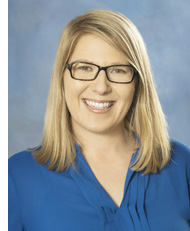ODA Official Shares Information on FSMA
According to an Oregon Department of Agriculture official, the most common question the department fields about the Food Safety Modernization Act, or FSMA, is, “Am I covered?”.
 |
Susanna Pearlstein, Produce Safety Program Manager, ODA |
The answer, in most cases, is “That depends,” said Susanna Pearlstein, produce safety program manager for the ODA.
Speaking in an Oregon Blueberry Commission sponsored webinar in December, Pearlstein said several factors determine whether your farm is covered under FSMA, including who you sell to.
Exemptions can be obtained, for example, if selling to a commercial processor who employs a validated kill step to reduce microbial contamination. And if a grower is selling a certain portion of their produce to what is known as a “qualified end user,” such as a restaurant, the grower could be eligible for an exemption.
In many cases, however, getting an FDA inspection of your farm or processing facility is mandated. But here again, she said, not all aspects of the Produce Safety Rule, which is the arm of FSMA that blueberry growers fall under, apply to all farms.
“It all depends on what you are growing and what activity is being conducted at the farm; whether you are growing, harvesting, packing or holding or doing all of them. And then (the rule) looks at how much you are selling,” Pearlstein said.
The ODA does not have a regulatory program when it comes to FSMA, Pearlstein said, and so focuses on technical assistance, education and outreach.
Susanna Pearlstein, ODA |
“At ODA, we spend a lot of our time trying to assist people in understanding if they are covered or not,” she said.
The Produce Safety Rule covers produce consumed raw, such as blueberries, and focuses on issues like worker health and hygiene, water and wildlife. The rule covers preharvest, harvest and postharvest activities.
The FDA, which administers the rule, began inspecting Oregon farms under the rule in 2019, initially with the idea of finishing up large farms, or those with more than $500,000 in sales, by the end of 2020 and then starting on smaller farms. Those plans were set back due to issues with COVID-19 and wildfires.
The FDA announced in late 2020 it will start inspecting small farms in April of 2021, but Pearlstein said on March 29 that due to COVID-19, no Oregon farms had as yet been contacted by FDA to schedule an inspection.
FDA inspectors like to be at farms during harvest when inspecting an operation, but will inspect at other times, as well, Pearlstein said. The agency calls to alert farms in advance of an inspection and wants farms to set aside two full days, although typically inspections will be completed in less than one day. “If something comes up, like a food safety issue, they will have time in the second day to work with you and address that,” Pearlstein said.
ODA offers several services that can help farmers comply with the Produce Safety Rule, including worker training in food safety, something the audit requires, and a pre-inspection service designed to help farms address issues pertinent to FDA inspections. “We try to leave you with suggestions of where you can improve to be in compliance,” Pearlstein said.
Pearlstein encouraged producers to take advantage of those services and to participate in ODA’s farm inventory program. As part of ODA’s agreement with FDA, the farm inventory is periodically provided to FDA so the agency knows which farms to inspect and which not to inspect. ODA’s technical assistance work provides several positive services, Pearlstein said, including letting growers know whether their farm is covered by the Produce Safety Rule and sharing nuances of the rule that may help save a farmer money.
For example, because the water portion of the rule is on hold, large farms don’t need to be sampling water, according to the rule, until 2022, she said.
One tip she passed along during the presentation is for farms to be sure to follow the food safety policies that they establish.
“One of the biggest things we’ve seen in on-farm-readiness reviews is farm policies aren’t necessarily being implemented,” she said. “It is important to make sure your policies are being followed.”
Pearlstein added that certification by a third-party food safety audit, something many buyers now require from growers, does not make a grower FSMA compliant.